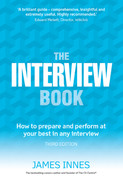Researching the job
The key to preventing pre-interview jitters is to be thoroughly prepared. We fear what we don’t know and what we can’t control, yet you can alleviate these fears by planning and preparing for your interview. Interviews are often seen as a gruelling experience – but they really shouldn’t be.
In most cases, you will be notified that you have got through to the interview stage at least a few days in advance. You can use this time to prepare, and the better prepared you are, the fewer your reasons to be nervous.
The first item on your list should be to thoroughly research the job.
Researching the job
If you are to convince a recruiter that you are right for the role, then you need to first get it clear in your own mind why you are right for the role, and you can’t do this unless you have properly researched and understood what it will involve.
Not knowing the ins and outs of a job is one of the worst blunders you can make in an interview – another is failing to demonstrate to the interviewer how you meet the requirements for the job.
A very large proportion of the questions you can expect to be asked will focus on the following two areas:
- Your understanding of what the job will entail, and
- Your suitability for fulfilling the demands of the job.
Information at your fingertips
Your first step should be to go over the job advert, description and/or person specification thoroughly. Most employers (and recruitment agencies) will have provided you with this type of information. Some organisations are kind enough to send out a whole wealth of literature to potential candidates, although most of this will relate to the organisation as a whole, not to the particular job for which you are applying. (We’ll come on to researching the organisation in the next chapter.)
See how your CV compares with the employer’s outline of the role, and try to identify both how and why you are a good match.
Questions you might be asked
Many interviewers will use either your CV or the job description/person specification as the agenda for your meeting. These are vital documents and you need to study them carefully. Now is the time to start envisaging what questions you might be asked – and to start drafting rough answers. We’ll talk about interview questions very comprehensively later in this book but, for now, you just need to be thinking how you can demonstrate that you meet the recruiter’s needs – and how you can evidence that through appropriate examples.
Questions you’d like to ask
You have the right to ask questions too. A prospective employer will not expect a candidate to make an informed decision about accepting the job if they don’t have all the necessary information. Taking a list of questions with you, which you developed while researching the role, will be beneficial.
